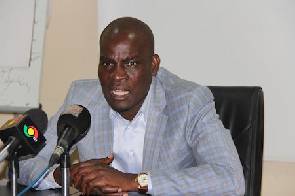 The Secretary-General of the Trades Union Congress (TUC), Mr Kofi Asamoah, has noted that all the high and low-profile corruption cases in the country are symptoms of a weak and failing state.
The Secretary-General of the Trades Union Congress (TUC), Mr Kofi Asamoah, has noted that all the high and low-profile corruption cases in the country are symptoms of a weak and failing state.
“The state has become deformed and unable to undertake the simple task of governing. All the high and low-profile corruption cases that have become all too pervasive are symptoms of a weak and failing state,“ he said.
In a paper titled, “Ghana’s Economy: A Concern for all”, presented at a forum organised by the Tema District Council of Labour, Mr Asamoah took on national leaders for failing to provide the kind of qualitative leadership that would have seen the state turn the circumstances of the people around.
The forum provided the TUC boss with the opportunity to perform an X-ray on the national economy, after which he warned that hopes for a better Ghana had been dwindling over many years because “the state is unable to undertake the simple task of governing”.
“We need to rescue and rehabilitate the state,“ he suggested.
Mr Asamoah prescribed some solutions that would transform the economy into a modern wealth-creating society.
“Overcoming our developmental challenges requires a skillful interplay of both the visible hand of the government and the invisible hand of the market,” he said.
Weakening state
Mr. Asamoah indicated that as the state grew weak, it paved the way for market forces to determine economic governance in the name of laissez-faire.
“But, as history teaches us, the winds of laissez-faire are not likely to blow in the desired direction when a country is steeped in under-development.
Therefore, financial liberalisation has brought in more banks, which are announcing huge profits, but the rest of the business community is reeling under a high interest rate regime that makes domestic production almost suicidal,“ he said.
He warned that it would be extremely disastrous for the nation to stand aloof in the midst of the interplay of forces working to draw back the economy.
“A developmental state should not stand aloof; it should intervene strategically to bring down interest rates because, in the long run, this business model isn’t in the interest of anyone, including the banks themselves,” he said.
Transfer of foreign currencies
Mr Asamoah cautioned against the continuous transfer of foreign currencies out of the country, especially by companies that did not themselves generate foreign currencies.
He mentioned particularly the telecom companies which, because of the nature of their business operations, did not bring in foreign currency beyond their initial capital requirements, yet “at the same time these companies generate so much domestic revenue and they are super-profitable”.
“They are foreign owned, which also means that they need to transfer profit to their shareholders in London, Johannesburg and other foreign destinations. And they definitely cannot transfer the cedis they generate in large quantities on a daily basis. What they do is to exchange those cedis for the dollars our hardworking cocoa farmers bring in,“ he said.
Such a development, he said, had serious consequences on the growth of the cedi.
“In such a situation as we find ourselves, the grand depreciation of the cedi against all major international currencies is only a matter of course. No currency can withstand such onslaught,” he warned.
Flowing from the development, Mr Asamoah said, the measures by the Bank of Ghana to revive the ailing cedi were only a representation of panic reaction that woefully failed to tackle the symptoms.
Economic policies
He said once Ghana had pursued economic policies that gave room for “attacks” from all angles, there was bound to be challenges within the economy.
“The economic policies have led to unbridled liberalisation of the economy, made import trade super lucrative, reduced domestic production and reduced the economy to buying and selling.
The TUC boss also touched on the country’s trade deficit and attributed it to factors including foreigners’ control of the bulk of Ghana’s exports which were raw materials.
“Foreigners own the gold mines and other solid mining concerns. The Jubilee oil is over 80 per cent owned by foreign companies and it is important that these companies have been guaranteed the right to retain over 80 per cent of their earnings outside the country.
“Effectively, however, some of them keep over 90 per cent of their earnings in offshore accounts. This means that of the over 40 per cent of our export revenues that come from gold, no more than 20 per cent of that gets retained in the country,” he said.
GDP
Mr Asamoah said it was sad that the country’s policy makers kept pointing at GDP growth as a sign of national development when it was clear such growth did not contribute to employment creation.
“They are pointing to our middle-income status when they know that we have come into middle income with all the characteristics of a lower-income country, paying the lowest wage rates with deteriorating social indicators,” he said.
The worker
The TUC Secretary General observed that the difficulties confronting the Ghanaian worker had accumulated over many years and had only come to a head around this time.
Mr Asamoah said the current difficulties, challenges and crisis had come as no surprise to labour.
In a statement, the Minister of Employment and Labour Relations, Nii Armah Ashietey, called on workers in the country to support the government’s vision and commitment over the medium term to build a prosperous and equitable society in pursuance of a common goal of advancing the ‘Better Ghana’ agenda.
That vision, he said, was anchored on the commitment to put people first, a strong and resilience economy, expanding infrastructure and transparent and accountable governance.
The minister commended the workers for looking beyond their usual expectations from employers to having a dialogue on Ghana’s economy.
He extended the President’s message of congratulation in advance to all workers in Ghana, both in the formal and the informal sectors, who had contributed their best to the development of the country.
Nii Ashietey noted that the government was focused on growth within an environment of economic stability.
He explained that to the worker it meant that if stability was maintained and the positive trend continued, the government would be able to afford demands for pay increases which implied that workers’ incomes would automatically increase.
Nii Ashietey appealed to workers to exercise patience while the National Tripartite Committee worked assiduously to finalise negotiations on the new National Daily Minimum Wage.
The Chairman of the National Development Planning Commission (NDPC), Mr P.V. Obeng, called for peaceful interchange of ideas and civil debate to achieve development.
He indicted Tema for losing its status as a port city and experiencing decline in both infrastructure and beauty.
He said the Tema Development Corporation and the Tema Metropolitan Assembly would need to form a partnership to change the face of Tema.
On the economy, Mr Obeng said Ghana was going through a crisis of transition because domestic and development partners were withdrawing support for poorer nations.
He observed that the ability to manage the crisis had created hardships.
Other speeches
The workers, in various speeches, called on the government to revamp the Tema Oil Refinery and allow it to independently work to make profit.
They also took the decision to fight against the creation of a free port at Atuabo.





